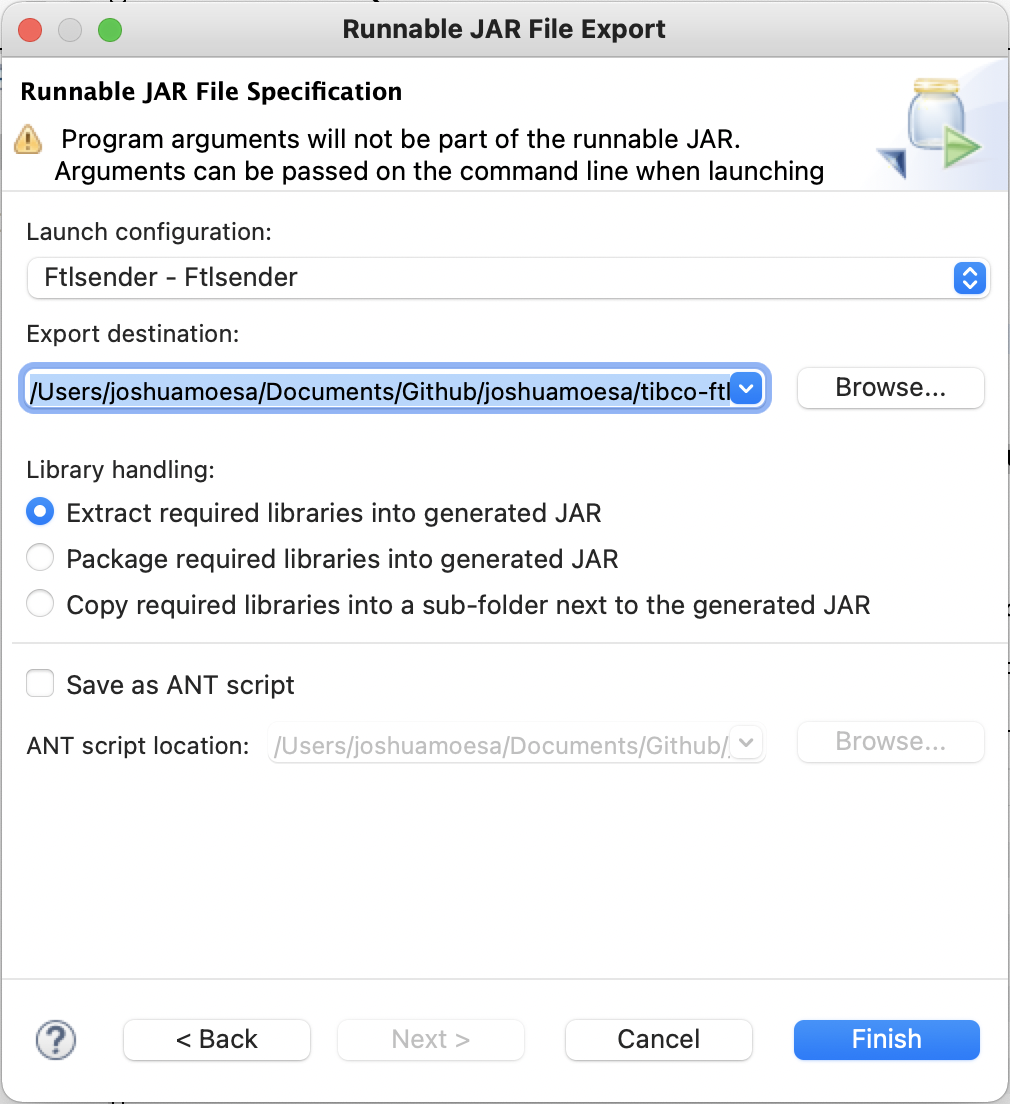Java programs to test the performance of TIBCO FTL server. Original code: https://gitlab.com/jbrandsma/ftlloadtester
For your convenience, an Eclipse workspace can be found under /src/
Locally installed:
- Java;
- TIBCO BusinessWorks ContainerEdition (version used: 2.5.4);
- TIBCO BusinessWorks FTL plugin;
- TIBCO FTL (version used: 6.6;
- Java.
Make sure that whilst creating runnable jars using Eclipse (right-click project > Export > Runnable JAR file), at Library handling option 'Extract required libraries into generated JAR.' is chosen.
Make sure that the bin folder of your FTL environment is included in the PATH variable:
export PATH=$PATH:/opt/tibco/ftl/6.6/bin
Make sure that you've placed the runnable jars in /opt/tibco/ftml/6.6/samples
CD to /opt/tibco/ftml/6.6/samples and run the setup script:
. ./setup
The programs need some (dynamic) libraries to run properly or else you will encounter error messages like "Exception in thread "Thread-0" java.lang.UnsatisfiedLinkError: no tibftljni in java.library.path: [/opt/tibco/ftl/6.6/bin]" To fix this, include a java.library.path environment variable in the run command:
java -Djava.library.path="/opt/tibco/ftl/6.6/lib" -jar Ftlsender.jar -R 'localhost:8585' -e tibsend-endpoint -a tibsend
It is possible to run multiple instances of both the sender as well as the receiver. Nevertheless make sure to always:
- Use separate statistics output files (-F switch)
- Use a unique instance Name (-i switch).
Produces load on FTL. Basic command to start the program:
java -Djava.library.path="/opt/tibco/ftl/6.6/lib" -jar Ftlsender.jar -R 'localhost:8585' -e tibsend-endpoint -a tibsend
The following switches can be used:
-i ==> instance name. This name is used to identify this instance in the log file. Default = instance1.
-R ==> realm host. By default http://localhost:8080 is used. Examle -R http//realm.org:8080
-e ==> endpoint name.
-a ==> application name.
-Smin ==> minimal message size (in bytes). Default = 100.
-Smax ==> maximum message size (in bytes). Default = 100.
-n ==> message name. Default = testMessage.
-h ==> nr of hits per second per thread. Default = 10.
-d ==> duration in minutes. Default = 1
-T ==> number of threads. Default = 1
-F ==> log file path and name. Default is not to use a file.
-u ==> username. Default is empty.
-p ==> password. Default is empty.
The ftlsender logs statistics to the console every 10 seconds. Apart from that a comma delimited output file with the statistics is generated if the -F switch s used. The following data is provided:
- instanceName
- threadID
- duration (in seconds)
- TOTAL number of hits since the start of the receiver
The ftlreciever is used to receive messages created with the sender.
The application be started with the following command:
java -Djava.library.path="/opt/tibco/ftl/6.6/lib" -jar Ftlreceiver.jar -R 'localhost:8585' -e tibsend-endpoint -a tibsend
The application takes the following options:
-i ==> instance name. This name is used to identify this instance in the log file. Default = instance1.
-R ==> realm host. By default http://localhost:8080 is used. Examle -R http//realm.org:8080
-e ==> endpoint name.
-a ==> application name.
-d ==> durable name.
-F ==> log file path and name. Default is not to use a file.
-u ==> username. Default is empty.
-p ==> password. Default is empty.
The ftlreceiver logs statistics to the console every 10 seconds. Apart from that a comma delimited output file with the statistics is generated if the -F switch s used. The following data is provided:
- instanceName,
- duration (in seconds)
- TOTAL number of hits since the start of the receiver
- Original source code https://gitlab.com/jbrandsma/ftlloadtester
- TIBCommunity - How can I resolve an FTL UnsatisfiedLinkeError for tibftljni.dll? https://community.tibco.com/questions/how-can-i-resolve-ftl-unsatisfiedlinkeerror-tibftljnidll
